Many view these drugs as good options for people with weight-related health conditions; doubts about national impact on obesity

Pew Research Center conducted this study to understand Americans’ views of drugs being used for weight loss. For this analysis, we surveyed 10,133 U.S. adults from Feb. 7 to 11, 2024.
Everyone who took part in the survey is a member of the Center’s American Trends Panel (ATP), an online survey panel that is recruited through national, random sampling of residential addresses. This way, nearly all U.S. adults have a chance of selection. The survey is weighted to be representative of the U.S. adult population by gender, race, ethnicity, partisan affiliation, education and other categories. Read more about the ATP’s methodology.
Here are the questions used for this report, along with responses, and its methodology.
A new Pew Research Center survey examines Americans’ attitudes about a new class of drugs being used for weight loss, including Ozempic and Wegovy.
In this report, we cover views of:
- The use of weight-loss drugs
- The impact of weight-loss drugs on obesity in America
- The factors that impact a person’s weight, including the role of willpower
Views of weight-loss drugs
About three-quarters of Americans say they have heard a lot or a little about Ozempic, Wegovy and other similar drugs that are being used for weight loss. Among those familiar with these drugs, 53% think they are good options to lose weight for people with obesity or a weight-related health condition, while just 19% think they are not good options and 28% say they’re not sure.
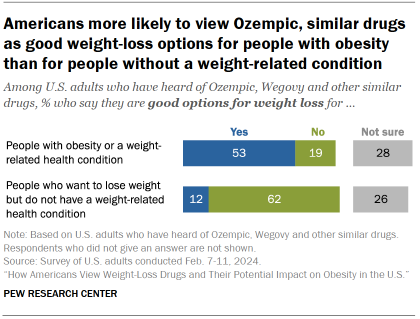
By contrast, just 12% of those familiar with these drugs say they are good options for people who want to lose weight but do not have a weight-related health condition. A far larger share (62%) say these drugs are not good options for people without a weight-related health condition, while 26% aren’t sure.
Ozempic and Wegovy belong to a class of drugs called GLP-1 agonists that manage blood sugar levels and suppress appetite. Ozempic is approved by the Food and Drug Administration for treating diabetes, while Wegovy is approved for people with obesity or excess weight who also have a weight-related health condition. Mounjaro and Zepbound are other similar drugs. Mounjaro is for treating diabetes, while Zepbound is for people with obesity.1
Demand for Ozempic and Wegovy has led to supply shortages, raising concerns about off-label use and impacting people who rely on these drugs to manage their health conditions.2
Impact of weight-loss drugs on obesity in America
Some experts have heralded drugs like Ozempic as a breakthrough for treating obesity in America and a catalyst for changing the way excess weight conditions are understood.3
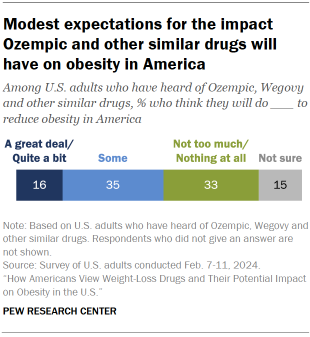
For now, the public has modest expectations for the impact drugs like Ozempic and Wegovy will have on obesity in the United States. Only 16% of those familiar with these drugs think they will do a great deal or quite a bit to reduce obesity, while 35% think they will do some and 33% expect they will do not much or nothing at all to reduce obesity in the U.S. (15% say they’re not sure).
About four-in-ten U.S. adults have obesity, according to the Centers for Disease Control and Prevention, and there’s been a significant increase in the share of Americans with this disease over the past two decades. Obesity is linked to a number of conditions that can lead to premature death, including heart disease and type 2 diabetes. It also accounts for billions of dollars in health care costs each year.
By and large, views on the use and impact of weight-loss drugs are similar across most major demographic groups. For instance, comparable shares of women (56%) and men (51%) who are familiar with these drugs think they are good options for weight loss for people with obesity or a weight-related health condition. And men and women are also similar in their expectations about the impact these drugs will have on obesity in the U.S. Go to the Appendix for more details.
One modest difference in views: Those who have heard a lot about these drugs are somewhat more optimistic than those who have heard a little to say they will reduce obesity in the U.S. a great deal or quite a bit (27% vs. 11%).
How Americans think about weight and weight loss
The boom in popularity of Ozempic and other similar drugs has become part of a broader societal discusion about weight and the factors that shape it, including behavior, environment and genetics.
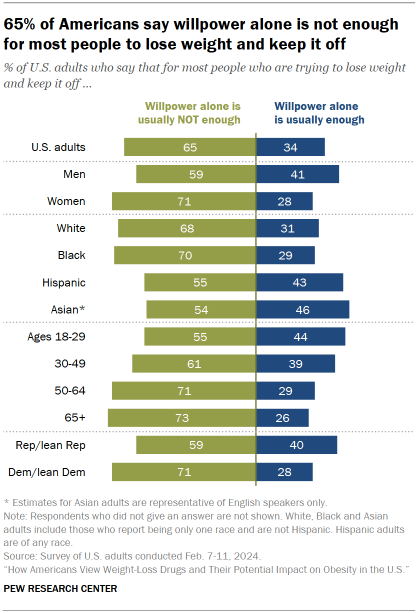
On balance, Americans do not believe willpower alone is enough to lose weight and keep it off. About two-thirds (65%) say willpower alone is usually not enough for people who are trying to lose weight and keep it off. By contrast, 34% think that willpower is usually enough for most people who are trying to lose weight.
The view that losing weight is not only a matter of willpower is widely held across most demographic groups. There are, however, some differences by demographic characteristics:
- Gender: Women are more likely than men to say willpower alone is not enough for most people (71% vs. 59%).
- Race and ethnicity: Large majorities of White and Black adults say willpower alone is not enough to lose weight and keep it off (68% and 70%, respectively). Smaller majorities of Hispanic and English-speaking Asian adults say the same (55% and 54%).
- Age: Larger shares of older than younger adults believe that willpower alone is not enough for most people to lose weight (though this remains the predominant view across all age groups).
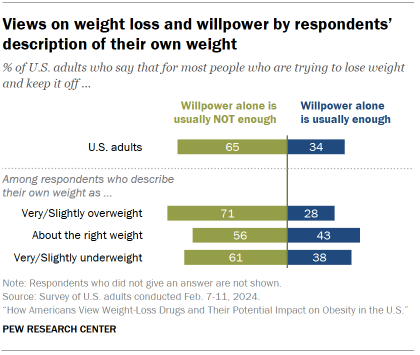
The survey also includes a question on respondents’ self-reported perception of their own weight that is used in CDC surveys.
Notably, majorities of adults across all perceived weight types say losing weight and keeping it off involves more than just willpower alone. Among those who describe their weight as very or slightly overweight, 71% say willpower alone is usually not enough for people who are trying to lose weight. Majorities of those who describe their weight as about right (56%) or very or slightly underweight (61%) also take this view, though by somewhat smaller margins.
What factors impact a person’s weight?
Asked about the impact of different factors on a person’s weight, Americans rank diet at the top of the list: A large majority says diet affects a person’s weight a great deal (57%) or quite a bit (29%). Exercise habits rank second, with 43% saying this impacts a person’s weight a great deal and 36% saying it has quite a bit of impact.
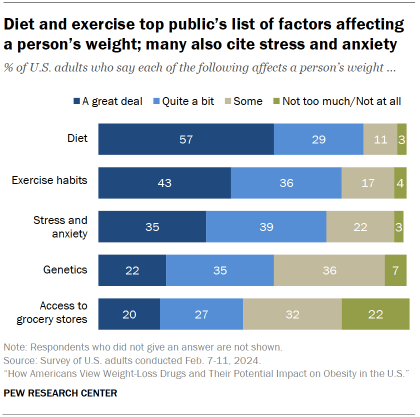
Three-quarters of Americans say stress and anxiety has at least quite a bit of impact on a person’s weight, including 35% who say it has a great deal of impact.
A majority also says genetics influence a person’s weight at least quite a bit, though the share saying genetics has a great deal of impact (22%) is 13 percentage points lower than the share who say the same about stress and anxiety.
Roughly half say access to grocery stores affects a person’s weight at least quite a bit, including 20% who say it has a great deal of impact. Access to grocery stores and things like safe, convenient places to exercise are among what public health experts describe as the social determinants of health.
Americans across different traits and demographic characteristics hold largely similar views on what affects a person’s weight. There are some modest differences in views by self-described weight: Adults who say they are very or slightly overweight are 11 points more likely to say stress and anxiety affects a person’s weight a great deal than those who describe their weight as about right (40% vs. 29%).
Men and women largely agree on the factors influencing weight. For instance, diet tops the list for both men and women.
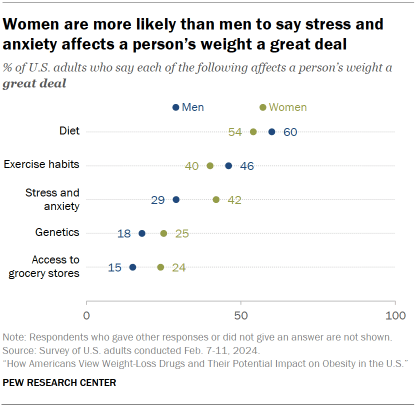
Still, women are more likely than men to emphasize the role of stress and anxiety.
Women are about as likely to say stress and anxiety affects a person’s weight a great deal as to say exercise has this level of impact (42% vs. 40%). Black and Hispanic women are especially likely to emphasize the impact of stress and anxiety on weight.
By contrast, men place more emphasis on exercise habits than stress and anxiety when it comes to factors that affect a person’s weight a great deal (46% vs. 29%).




